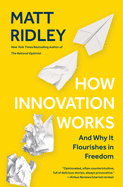
It might be common to think of innovation as the work of isolated geniuses--names that come synonymous with companies, technological advances and singular inventions that reshape the world such, like Jobs, Gates or Zuckerberg. However, in How Innovation Works, British journalist Matt Ridley (The Evolution of Everything) asks readers to instead reconsider what they think they know about how human society makes advances, and consider innovation instead "as a gradual, incremental, collective yet inescapably inevitable process," one that turns "ideals into practical, reliable, and affordable reality."
Ridley considers mechanical developments such as steam engines and turbines, as well as the development of reliable lightbulbs; vaccines and antibiotics; advances in food storage; and public infrastructure such as sanitation and clean drinking water. Through these anecdotal demonstrations, he suggests that world-changing innovation is about bridging the gap between inventions for inventions' sake and making new ideas useful.
The book is accessibly grouped by themes, which include transportation, food, communication and computing, prehistory and energy. It also includes sections on failure, the economics of innovation, resistance to innovation and what conditions are essential to innovation flourishing. Ridley's ultimate argument through his myriad examples is that innovation is a slow, collaborative, not always linear process that the modern age depends on, rather than the fallacy of a great mind driving change, and that the intellectual freedom that fosters it should be protected. How Innovation Works is a provocative and necessary read for considering future directions for societies and governments. --Michelle Anya Anjirbag, freelance reviewer

